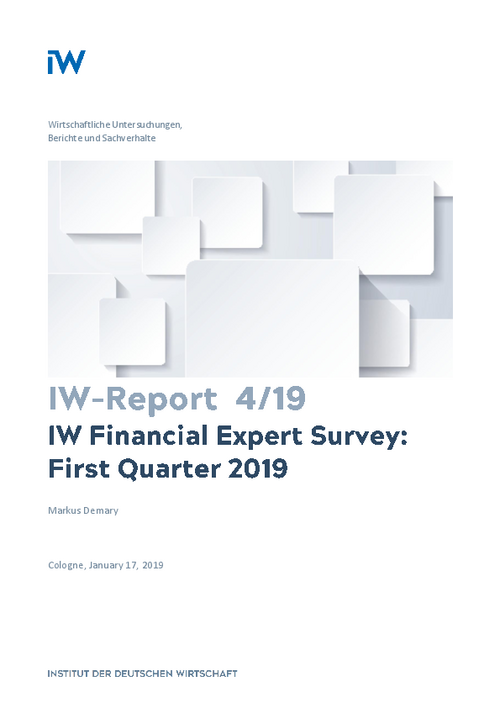Pessimism determines the experts’ predictions for the first and second quarter of 2019 which can be inferred from the downward revisions of the experts’ forecasts.

IW Financial Expert Survey: First Quarter 2019

Pessimism determines the experts’ predictions for the first and second quarter of 2019 which can be inferred from the downward revisions of the experts’ forecasts.
Although the experts still expect the yield curve to become steeper, they expect long-term interest rates to increase less compared to the last survey. The lower interest rate forecasts are consistent with the experts’ lower inflation and growth expectations. The experts expect 1.7 percent inflation in the Eurozone and a growth rate of real gross domestic product of 1.6 percent for 2019, which indicates a slowdown of economic growth and a failure of the European Central Bank (ECB) in meeting its inflation target. Given that, the experts expect the long-term interest rate to be 0.51 percent at the end of the first quarter of 2019, which is 0.24 percentage points lower than their prediction in the last survey. For the short rate the experts expect no change, since they expect the ECB’s main refinancing rate to stay at 0.0 percent in the first half of 2019. But the experts expect the yield of US Treasury bonds to increase from 2.86 percent to 3.31 percent by the end of the first half of 2019 and thereby a growing interest rate differential between the US and Europe. Given the less accommodative monetary policy by the ECB in 2019 the experts forecast of a mild appreciation of the Euro from 1.138 US-Dollar to 1.143 US-Dollar in the first quarter and to 1.162 US-Dollar in the second quarter of 2019.
Although the experts revised their stock market forecasts downwards, they expect the DAX and the Stoxx index to recover in the first half of 2019. On average, the experts predict the Stoxx index to increase from 2.807 points at the end of the fourth quarter of 2018 to 2.951 points at the end of the first quarter of 2019 and to 3.072 points at the end of the second quarter of 2019. This would correspond to increases of 5.1 percent and 9.4 percent since December 2018. Moreover, the experts expect the DAX to increase from 10.788 to 11.396 in the first quarter of 2019 and to 11.919 in the second quarter of 2019, which corresponds to increases by 5.6 and 10.5 percent since end of December 2018. Interesting is that the experts expect the Stoxx and the DAX to grow faster than the S&P 500, which we surveyed for the first time. For the S&P 500 the experts only expect increases by 0.7 and 5.3 percent.
In the long-term ranking, which covers the last 16 quarters, National-Bank could defend rank one, while Commerzbank and Nord/LB could defend rank two and rank three.

IW Financial Expert Survey: First Quarter 2019


Fin.Connect.NRW-Fachveranstaltung: Banken werden klimaneutral – Welche Konsequenzen ergeben sich für Unternehmen?
Die globalen Megatrends Demografie, Dekarbonisierung, Digitalisierung und De-Globalisierung treffen auf die Industrieregion NRW. Um den Strukturwandel erfolgreich zu bewältigen, müssen die Unternehmen in NRW jährlich 98 Mrd. Euro in Dekarbonisierung und ...
IW
Wie hoch sind die Investitionsbedarfe in die klimaneutrale und digitale Transformation in NRW?
Für die Finanzierung der klimaneutralen und digitalen Transformation müssen in NRW jährlich mindestens 100 Mrd. Euro investiert werden. Dies ergab diese Meta-Analyse der vorhandenen Studien zum Investitionsbedarf in die Digitalisierung. Dabei fallen allein zur ...
IW